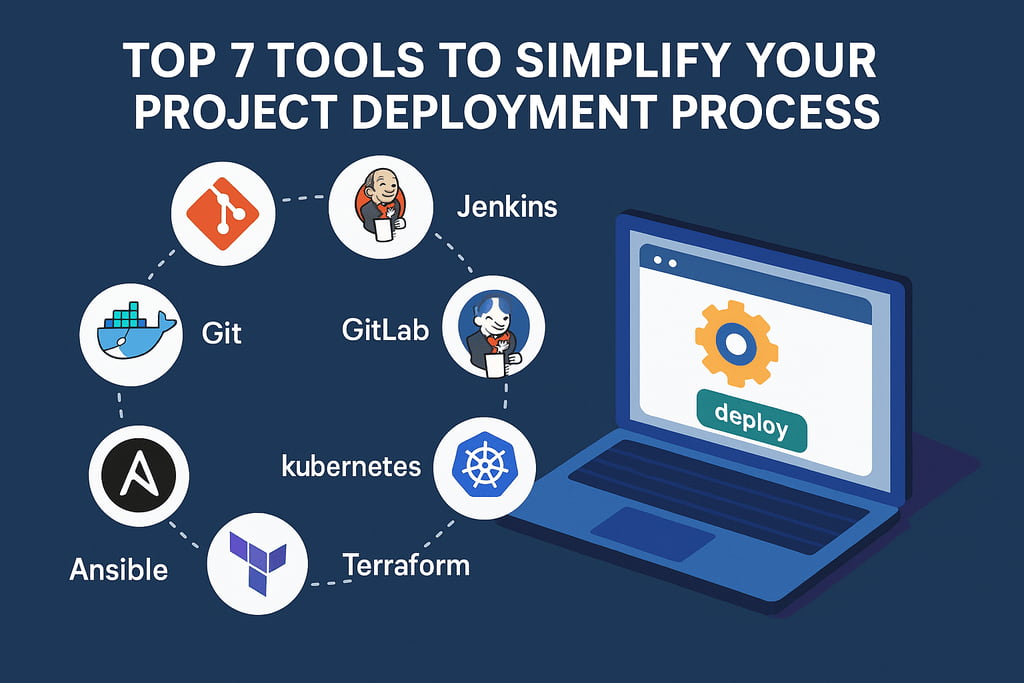Introduction
Do you feel stuck every time you deploy your project?
You’re not alone. Whether you’re launching a new web app, a mobile application, or deploying microservices—project deployment can become a major headache if not managed properly.
The good news?
There are powerful deployment tools that can make your job easier, faster, and error-free. In this blog, we’ll explore the top 7 tools that simplify project deployment, save your time, and ensure everything goes live smoothly.
Let’s dive in..
1. Jenkins – The King of CI/CD Automation
Why it’s powerful:
Jenkins is an open-source automation server widely used for building and deploying applications automatically. It supports hundreds of plugins and integrates with almost every tool in the DevOps pipeline.
Key Features:
- Automates build and deployment tasks
- Supports pipelines as code
- Massive community support
- Integrates easily with Git, Docker, Kubernetes, etc.
Perfect for: Developers and DevOps teams who want full control over the CI/CD process.
Curiosity booster: Want to run a full pipeline from code commit to production in under 5 minutes? Jenkins can make it happen.
2. GitHub Actions – Deploy Straight from Your Repository
Why it’s exciting:
If you’re already using GitHub, GitHub Actions allows you to deploy your project directly from your repository without needing third-party tools.
Key Features:
- Workflow automation for build/test/deploy
- Simple YAML configuration
- Supports matrix builds for multiple OS
- Secure and easy to maintain
Perfect for: GitHub users who want to simplify CI/CD without leaving their codebase.
Fun fact: With GitHub Actions, you can deploy your app every time you push code—automatically.
3. Netlify – One-Click Deployment for Web Projects
Why developers love it:
Netlify is the dream tool for frontend developers. It allows you to drag and drop your site or connect your Git repo and get it deployed instantly.
Key Features:
- Continuous deployment from Git
- Built-in CDN & HTTPS
- Serverless functions support
- Super-fast previews and rollbacks
Perfect for: Jamstack sites, static websites, and modern frontend projects.
Bonus: Netlify even gives you preview URLs for every pull request. How cool is that?
4. Docker – Consistent Environments for Easy Deployment
Why it’s a game-changer:
Docker lets you package your app and all its dependencies into containers, ensuring it runs the same everywhere—from dev to production.
Key Features:
- Lightweight, fast, and portable
- Isolates environments
- Works great with Kubernetes, AWS, Azure
- Massive ecosystem
Perfect for: Teams dealing with environment-related bugs or scaling microservices.
Think of Docker as a “time capsule” for your project—it works the same way today, tomorrow, or next year.
5. Vercel – Frontend Deployment, Redefined
Why it stands out:
Created by the team behind Next.js, Vercel is made for developers who want speed, simplicity, and automation. Ideal for frontend frameworks like React, Vue, and Svelte.
Key Features:
- Instant deployment from Git
- Auto-scaling with zero config
- Fastest edge network
- Built-in analytics
Perfect for: Frontend developers building dynamic sites or apps.
Curiosity kick: Your app could go live globally in under 10 seconds—yes, really.
6. AWS CodeDeploy – Enterprise-Ready Deployment Power
Why it’s powerful:
If you’re working on a large-scale application or in an enterprise environment, AWS CodeDeploy offers highly customizable deployment capabilities.
Key Features:
- Supports EC2, Lambda, and on-prem servers
- Automatic rollback on failure
- In-depth logging and monitoring
- Seamless integration with AWS ecosystem
Perfect for: Enterprises or developers using AWS infrastructure.
Pro tip: Combine it with CodePipeline and CloudWatch for a full AWS DevOps suite.
7. Heroku – Easiest Way to Deploy Without Server Hassle
Why it’s so beginner-friendly:
Heroku lets you deploy apps using simple Git commands. It’s like magic—push your code, and boom! Your app is live.
Key Features:
- Deploy directly from GitHub or CLI
- Built-in database (PostgreSQL)
- Add-ons for caching, monitoring, etc.
- Free plan available for hobby projects
Perfect for: Startups, students, or solo developers who want speed without managing servers.
Curious fact: Many successful startups deployed their MVPs using Heroku first.
Conclusion: Simplify, Automate, and Deploy with Confidence
Project deployment doesn’t have to be scary or stressful. Whether you’re a beginner or a pro, these tools can help you:
- Deploy faster
- Avoid manual errors
- Scale with ease
- Sleep better at night
So, which tool will you try first?


